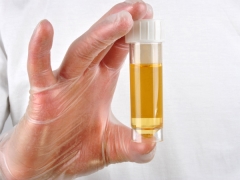Mucus in the urine of a child
Examination of the blood and urine of children helps to find out if everything is in order with the baby’s health. And if there are any concerns, the doctor immediately prescribes such tests. What does the appearance of a significant amount of mucus in it indicate? Could she be normal and should parents worry about her discovery?
What is it?
Mucus is produced in the urethra - in the mucosal goblet cells. Its main function is to protect the urinary tract from urea and other components of urine. In addition, mucus is designed to protect the urinary system from infectious agents. Her parents may notice an excess amount visually. Children's urine will become turbid, will include mucous sediment, lumps or flagella of mucus.
What analysis is detected?
The definition of mucus is included in urinalysis indicators. In the form of the results of this study, you can see whether there was mucus in the sample, and how much it was detected.
Norm
In healthy babies, the amount of mucus excreted in the urine is very small. It enters the urethra. Detection of a small amount of mucus refers to the rate indicator. It is designated in the analysis as "traces", "1" or "+".
The reasons
Of the harmless factors that can lead to an increased amount of mucus in the urine, include:
- Incorrect collection of the sample, for example, badly undermined the child, the container was non-sterile, and the urine container was kept at room temperature for a long time before being taken to the laboratory.
- Non-compliance with the rules of hygiene in the care of the child’s genitals.
- Long stay of urine in the urinary tract. It may be associated with medication or the child’s intentional retention of urine.
Pathological causes of excess mucus in pediatric urine are:
- Cystitis and urethritis. Inflammatory infectious diseases are one of the main reasons for which more mucus is secreted.
- Dysmetabolic disorders of the kidneys. In the organs of the excretory system accumulates a lot of salt, they irritate the mucous membranes and can cause inflammation. The reason for the occurrence of such violations is often the lack of water consumption by the child and poor nutrition.
- Vulvovaginitis caused by streptococci, fungi, Escherichia coli and other pathological flora.
- Phimosis. The mucous secretion that accumulates under the foreskin gets into the urine.
- In rare cases, glomerulonephritis and pyelonephritis.
What characteristics still need to pay attention?
- If, in addition to the increased amount of mucus in the form, you will see a large number of leukocytes and epithelium, this indicates an inflammatory process in the urinary system. Also, when inflammation can be detected bacteria and red blood cells.
- If there is a lot of mucus and a large amount of salts is detected, such a pattern is characteristic of dysmetabolic nephropathy. If there is a lot of salt or a stone has been formed, red blood cells will also appear in the analysis.
- If, in addition to an excessive amount of mucus in the urine, a protein is detected, the child will suspect an inflammatory process and other kidney diseases.

Diagnostics
The appearance of mucus in the urine can be a symptom of pathology, if in addition a child has urinary disorders, other changes in urine, pain, and intoxication If the parents have noted such signs in the child and showed the baby to the specialist, and the analysis revealed mucus in an increased amount, then the child is prescribed an additional examination.
Urinalysis should certainly be retaken again to eliminate errors associated with the collection and transportation of the sample. The specialist will also send the child to sample by Nechiporenko, ultrasound, blood test, Bakposev. Sometimes prescribed cystoscopy, x-rays and tomography.
Recommendations
- To prevent false results, urine should be collected correctly. It is important to wash the baby well before taking biological material, and also prepare a sterile container for taking the material for analysis. It is best to buy in the pharmacy urinal for infants and a sterile container for older children.
- Make sure that the container with collected urine does not stand for a long time at room temperature. A container with a sample should be brought to the laboratory no later than 1-2 hours after urinating a child.
- It is also important that the interval between the previous urination and urine collection be no longer than 6 hours.
- Parents should remember that the causes of frequent inflammatory diseases of the urinary organs are the peculiarities of their structure and functioning. In babies, kidney tissue matures and differentiates to 3 years of age, and the urethral mucosa is more vulnerable. In addition, the blood supply and innervation of the urethra at an early age is still immature, and the ureters are wide, which leads to frequent stagnation of urine.
- If the amount of mucus in the analysis is increased, but there are no complaints and other signs of the infectious process, you can not worry, and after a while for complacency, pass the analysis again, without forgetting about the correct preparation.













